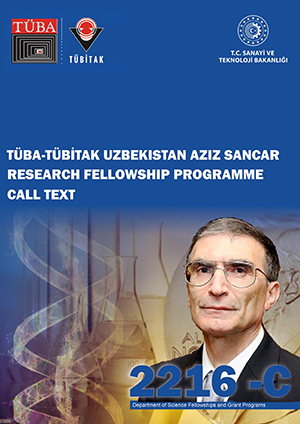Arama
Ev sahibi kurum özel sektör olsa da lisansüstü öğrenciler proje ekibine dahil edilebilmektedir.
Programa akademiden başvuran adayın doktora mezunu olması ve en az doktora sonrası araştırma deneyimine sahip olması gerekmektedir. Bu sebeple doktora öğrencisi olarak yurt dışında geçirilen süre çalışma deneyimi sayılmamaktadır.
Adayın en az proje süresince araştırmacı olarak davet edildiğini ve ev sahibi kurumun imkanlarından faydalanabileceğini belirten bir davet mektubu yeterlidir.
Yurt dışı kurum/kuruluşların Türkiye’deki şubeleri yerleşik şirket sayılmaktadır.
Proje için yürütücü dışında danışman belirleme zorunluluğu bulunmamaktadır.
Proje bittikten sonra mecburi hizmet yükümlülüğü bulunmamaktadır. Ancak yürütücünün Türkiye’de kalarak bilimsel ve/veya teknolojik katkılarına devam etmesi arzu edilmektedir.
Tüm devlet ya da vakıf üniversiteleri ev sahibi kurum olabilir.
Yürütücü ailesini yanında getirebilir. Program kapsamında yürütücünün ailesi için de sağlık sigortası ve aylık yaşam giderleri desteği sağlanmaktadır.
Araştırmaya ev sahipliği yapacak kurum olarak öncelikle YÖK’ün belirlediği araştırma üniversitelerinden, diğer devlet üniversitelerden ya da vakıf üniversitelerinden biri tercih edilebilir.
Destek kararı Başkanlık onayından sonra kesinleşecektir, bu sebeple kaç başvurunun destekleneceği bilinmemektedir. Bütçe kapsamında, mümkün olduğunda çok araştırmacının desteklenmesi arzu edilmektedir.
Proje kapsamında araştırma ekibine dahil edilecek bursiyerlerin Türkiye’de lisansüstü programlarına kayıtlı olmaları gerekmektedir.
Yurt dışında kalış süresinin uzaması halinde 3 aylık süreyi aşan kısımla ilgili yapılacak işlem Grup Yürütme Kurulu’nda karara bağlanır.
Araştırma desteğinin alt kalemlerinde limit bulunmamaktadır.
Proje kapsamında ekipteki bursiyerin seyahat giderleri proje desteğinden karşılanabilir.
Proje öneri formatı İngilizce’dir ve önerinin İngilizce hazırlanması beklenmektedir.
Programa başvuru yaparken tek bir kurumun davet mektubu kullanılabilmektedir.
Proje yürütücüsünün gerekçeli dilekçe ile kurum değişikliği talep etmesi halinde durumu Grup Yürütme Kurulunda (GYK) görüşülerek karara bağlanır. Kurul kararı ve Başkanlık Makamı onayı ile kurum değişikliği yapılabilir.
Başvuru dönemi sona erdikten sonra ön inceleme yapılacaktır. Ön incelemeyi geçen adayların başvuruları bilimsel değerlendirmeye alınacaktır. Bilimsel değerlendirme sonucunda oluşturulan puan listesi için GYK’da baraj puan belirlenecek ve Başkanlık onayından sonra destek kararı açıklanacaktır.
Özel sektör kuruluş bünyesinde çalışan lisansüstü öğrenciler kısmi burs ödemesi alabilirler.
Program kapsamında yaş sınırı bulunmamaktadır. Emekli araştırmacılar başvuru yapabilir.
Daha önceden aldığı burs veya destek ile yurt dışına eğitim, araştırma vb. amacıyla ile giden ve Türkiye’ye dönüşünde mecburi hizmeti bulunan araştırmacılar bu programa yürütücü olarak başvuru yapamazlar.
Araştırmacının durumu ön inceleme sonucunda GYK kararı ile kesinleşir. Başvuru, karara göre bilimsel değerlendirmeye alınabilir.
Araştırma başlangıç paketi ödeneği projenin alt yapı çalışmalarında kullanılmak üzere tek seferde kurum özel hesabına aktarılır. Araştırma desteği projenin makine teçhizat, hizmet, seyahat ve sarf giderleri için dönemler halinde kurum özel hesabına aktarılır ve proje süresince kullanılabilir.
Sağlık ve yol giderlerinden vergi kesintisi yapılmaktadır. Kalan tüm kalemler net olarak yürütücü hesabına ya da kurum özel hesabına aktarılmaktadır. Kurum özel hesabına aktarılan kalemlerin harcamalarına ilişkin yapılması gereken yasal kesintiler ev sahibi kurum sorumluluğundadır.
Uluslararası araştırmacılar pasaport numarası ile ARBİS’e kayıt olabilir ve başvuru sistemine erişebilirler.
Uluslararası araştırmacılar için farklı herhangi bir belge istenmemektedir.
Ev sahibi kurum özel sektör olsa da lisansüstü öğrenciler proje ekibine dahil edilebilmektedir.
Programa akademiden başvuran adayın doktora mezunu olması ve en az doktora sonrası araştırma deneyimine sahip olması gerekmektedir. Bu sebeple doktora öğrencisi olarak yurt dışında geçirilen süre çalışma deneyimi sayılmamaktadır.
Adayın en az proje süresince araştırmacı olarak davet edildiğini ve ev sahibi kurumun imkanlarından faydalanabileceğini belirten bir davet mektubu yeterlidir.
Yurt dışı kurum/kuruluşların Türkiye’deki şubeleri yerleşik şirket sayılmaktadır.
Proje için yürütücü dışında danışman belirleme zorunluluğu bulunmamaktadır.
Proje bittikten sonra mecburi hizmet yükümlülüğü bulunmamaktadır. Ancak yürütücünün Türkiye’de kalarak bilimsel ve/veya teknolojik katkılarına devam etmesi arzu edilmektedir.
Tüm devlet ya da vakıf üniversiteleri ev sahibi kurum olabilir.
Yürütücü ailesini yanında getirebilir. Program kapsamında yürütücünün ailesi için de sağlık sigortası ve aylık yaşam giderleri desteği sağlanmaktadır.
Araştırmaya ev sahipliği yapacak kurum olarak öncelikle YÖK’ün belirlediği araştırma üniversitelerinden, diğer devlet üniversitelerden ya da vakıf üniversitelerinden biri tercih edilebilir.
Destek kararı Başkanlık onayından sonra kesinleşecektir, bu sebeple kaç başvurunun destekleneceği bilinmemektedir. Bütçe kapsamında, mümkün olduğunda çok araştırmacının desteklenmesi arzu edilmektedir.
Proje kapsamında araştırma ekibine dahil edilecek bursiyerlerin Türkiye’de lisansüstü programlarına kayıtlı olmaları gerekmektedir.
Yurt dışında kalış süresinin uzaması halinde 3 aylık süreyi aşan kısımla ilgili yapılacak işlem Grup Yürütme Kurulu’nda karara bağlanır.
Araştırma desteğinin alt kalemlerinde limit bulunmamaktadır.
Proje kapsamında ekipteki bursiyerin seyahat giderleri proje desteğinden karşılanabilir.
Proje sonuçlanınca Türkiye’de kalma zorunluluğu yoktur ancak araştırmacının Türkiye’de kalarak bilimsel ve/veya teknolojik katkılarına devam etmesi arzu edilmektedir.
TÜBİTAK - BİDEB 2232-A
ARAŞTIRMA BURS VE DESTEKLERİ GRUP KOORDİNATÖRLÜĞÜ
2232-A Uluslararası Lider Araştırmacılar Programı
Adres: TÜBİTAK Başkanlık Binası
Tunus Caddesi No:80 Kavaklıdere
ÇANKAYA/ANKARA PK:06100
Tel: 444 6690
E-Posta: bideb2232@tubitak.gov.tr
TÜBİTAK - BİDEB 2232-A
2232-A International Fellowship for Outstanding Researchers
Adress: TÜBİTAK Başkanlık Binası
Tunus Caddesi No:80 Kavaklıdere
ÇANKAYA/ANKARA PK:06100
Phone: 444 6690
e-mail: bideb2232@tubitak.gov.tr
Bu programın amacı; Türkiye Bilimler Akademisi (TÜBA) Başkanlığı ve Türkiye Bilimsel ve Teknolojik Araştırma Kurumu (TÜBİTAK) arasında 27.12.2022 tarihinde imzalanan protokole istinaden Türkiye ve Özbekistan arasında doktora sırası ve doktora sonrası bilimsel ve teknolojik işbirliğinin teşvik edilmesidir.
Çağrı için lütfen resme tıklayınız.

The purpose of the programme, which was prepared pursuant to the protocol signed between TÜBİTAK and TÜBA on 27.12.2022, is to promote of scientific and technological cooperation during and after doctoral studies between Türkiye and Uzbekistan. This call announcement covers the procedures and obligations related to the applicants and/or international young researchers supported by the programme.
For detailed information, please click the following image.

